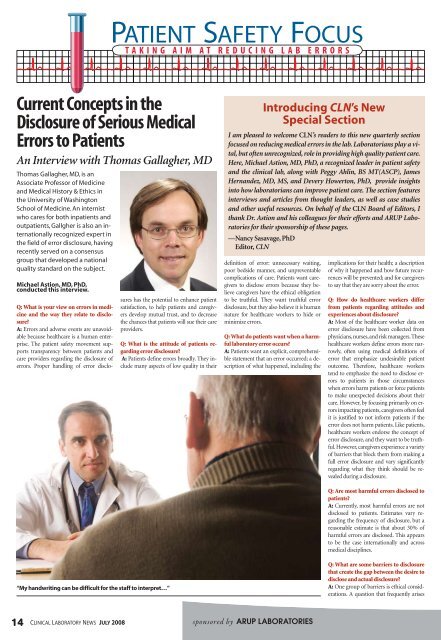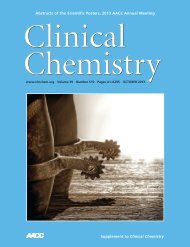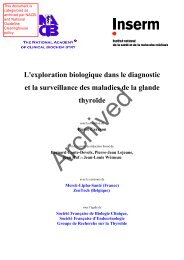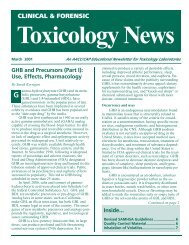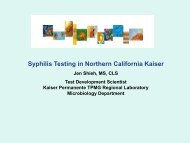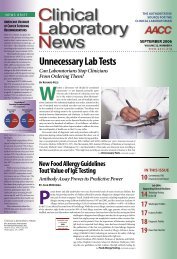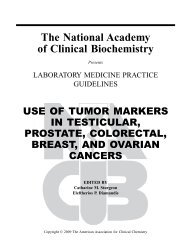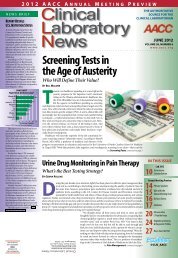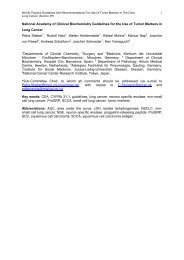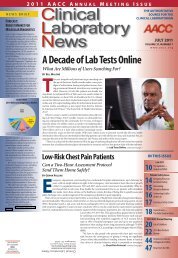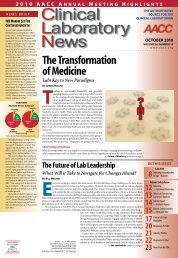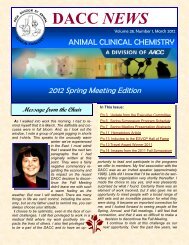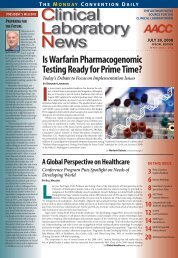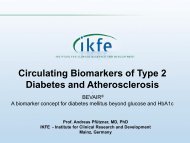Clinical Laboratory News - American Association for Clinical ...
Clinical Laboratory News - American Association for Clinical ...
Clinical Laboratory News - American Association for Clinical ...
Create successful ePaper yourself
Turn your PDF publications into a flip-book with our unique Google optimized e-Paper software.
14 CliniCal laboratory news JuLy 2008<br />
PATIENT SAFETY FOCUS<br />
Current Concepts in the<br />
Disclosure of Serious Medical<br />
Errors to Patients<br />
An Interview with Thomas Gallagher, MD<br />
thomas gallagher, Md, is an<br />
associate professor of Medicine<br />
and Medical History & ethics in<br />
the university of washington<br />
school of Medicine. an internist<br />
who cares <strong>for</strong> both inpatients and<br />
outpatients, gallgher is also an internationally<br />
recognized expert in<br />
the field of error disclosure, having<br />
recently served on a consensus<br />
group that developed a national<br />
quality standard on the subject.<br />
michael astion, md, phd,<br />
conducted this interview.<br />
Q: What is your view on errors in medicine<br />
and the way they relate to disclosure?<br />
A: Errors and adverse events are unavoidable<br />
because healthcare is a human enterprise.<br />
The patient safety movement supports<br />
transparency between patients and<br />
care providers regarding the disclosure of<br />
errors. Proper handling of error disclo-<br />
sures has the potential to enhance patient<br />
satisfaction, to help patients and caregivers<br />
develop mutual trust, and to decrease<br />
the chances that patients will sue their care<br />
providers.<br />
Q: What is the attitude of patients regarding<br />
error disclosure?<br />
A: Patients define errors broadly. They include<br />
many aspects of low quality in their<br />
“my handwriting can be difficult <strong>for</strong> the staff to interpret…”<br />
TAkING AIM AT REDUCING LAB ERRORS<br />
introducing CLN’s new<br />
special section<br />
I am pleased to welcome CLN’s readers to this new quarterly section<br />
focused on reducing medical errors in the lab. Laboratorians play a vital,<br />
but often unrecognized, role in providing high quality patient care.<br />
Here, Michael Astion, MD, PhD, a recognized leader in patient safety<br />
and the clinical lab, along with Peggy Ahlin, BS MT(ASCP), James<br />
Hernandez, MD, MS, and Devery Howerton, PhD, provide insights<br />
into how laboratorians can improve patient care. The section features<br />
interviews and articles from thought leaders, as well as case studies<br />
and other useful resources. On behalf of the CLN Board of Editors, I<br />
thank Dr. Astion and his colleagues <strong>for</strong> their ef<strong>for</strong>ts and ARUP Laboratories<br />
<strong>for</strong> their sponsorship of these pages.<br />
—Nancy Sasavage, PhD<br />
Editor, CLN<br />
definition of error: unnecessary waiting,<br />
poor bedside manner, and unpreventable<br />
complications of care. Patients want caregivers<br />
to disclose errors because they believe<br />
caregivers have the ethical obligation<br />
to be truthful. They want truthful error<br />
disclosure, but they also believe it is human<br />
nature <strong>for</strong> healthcare workers to hide or<br />
minimize errors.<br />
Q: What do patients want when a harmful<br />
laboratory error occurs?<br />
A: Patients want an explicit, comprehensible<br />
statement that an error occurred; a description<br />
of what happened, including the<br />
implications <strong>for</strong> their health; a description<br />
of why it happened and how future recurrences<br />
will be prevented; and <strong>for</strong> caregivers<br />
to say that they are sorry about the error.<br />
Q: How do healthcare workers differ<br />
from patients regarding attitudes and<br />
experiences about disclosure?<br />
A: Most of the healthcare worker data on<br />
error disclosure have been collected from<br />
physicians, nurses, and risk managers. These<br />
healthcare workers define errors more narrowly,<br />
often using medical definitions of<br />
error that emphasize undesirable patient<br />
outcome. There<strong>for</strong>e, healthcare workers<br />
tend to emphasize the need to disclose errors<br />
to patients in those circumstances<br />
when errors harm patients or <strong>for</strong>ce patients<br />
to make unexpected decisions about their<br />
care. However, by focusing primarily on errors<br />
impacting patients, caregivers often feel<br />
it is justified to not in<strong>for</strong>m patients if the<br />
error does not harm patients. Like patients,<br />
healthcare workers endorse the concept of<br />
error disclosure, and they want to be truthful.<br />
However, caregivers experience a variety<br />
of barriers that block them from making a<br />
full error disclosure and vary significantly<br />
regarding what they think should be revealed<br />
during a disclosure.<br />
Q: Are most harmful errors disclosed to<br />
patients?<br />
A: Currently, most harmful errors are not<br />
disclosed to patients. Estimates vary regarding<br />
the frequency of disclosure, but a<br />
reasonable estimate is that about 30% of<br />
harmful errors are disclosed. This appears<br />
to be the case internationally and across<br />
medical disciplines.<br />
Q: What are some barriers to disclosure<br />
that create the gap between the desire to<br />
disclose and actual disclosure?<br />
A: One group of barriers is ethical considerations.<br />
A question that frequently arises


